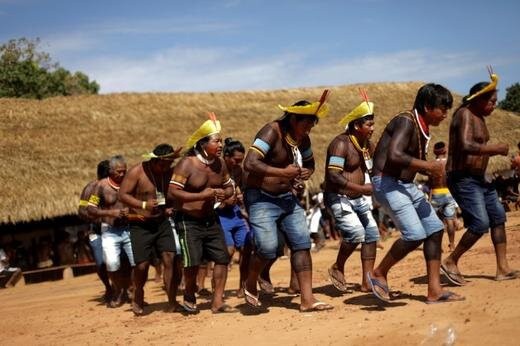Brazil Indigenous Community Pose Problems to Bolsonaro's Mining Projects

President Jair Bolsonaro of Brazil is planning to allow the mining industry of the country to touch its indigenous reserves. However, there is a problem with the Mura indigenous community, a Brazil indigenous group, over the vast potash mine in a distant area in the Amazon rainforest. The president should probably consider this issue for the possible conflicts that may arise from his plans.
Potássio do Brasil's Mining Plans
The name of the mining company that plans to take on the project is Potássio do Brasil. It is a multinational Canadian company based in Forbes and Manhattan.
Potash is a type of fertilizer that is abundantly used by the agriculture industry.
In 2010, the company had discovered a large deposit of potash in the municipality of Autazes, Brazil. Upon the discovery, the company hurriedly announced to the public of its plans to operate a $2.5 billion potash mine.
The potash reserve is situated near the Madeira River. It is the place where soya is being transported from Mato Grosso to ships bound for Europe and China. Mato Grosso is the biggest soya-providing state in Brazil.
According to Guilherme Jácome, Potássio do Brasil's project development director, the potash mining project can allow the operations to be stacked with potash as it makes its way to the Madeira River. He said that this project would make the operations more cost-effective.
The company had obtained its permit to conduct mining operations in Brazil in 2013.
Invasion in Mura Indigenous Community's Ancestral Land
The Mura indigenous community's leader Aldinélson Pavão said that the mining location is their ancestral land. He said that he was born and raised on their land, as were his parents and grandparents. He stands firm that he will not allow Potássio do Brasil to invade his ancestors' land.
One of the major products produced by potash is salt.
Potássio do Brasil claims that their mining activity can prevent salt from leaking to rivers and aquifers. However, the Brazil indigenous group is still concerned because of the region's heavy rains and high heat.
The community is worried about their land's future. In 20 to 30 years, the operations will end. The children and grandchildren of the tribe will be the ones who will suffer from the operations.
Temporary Project Halt
In March 2017, the Mura indigenous tribe was represented by the public prosecutor's office in Brazil during a court meeting involving the mining operations of Potássio do Brasil in their land. It had temporarily stopped the project until a "free, prior and informed consultation" was made.
The case won by the Mura indigenous tribe is the first case in Brazil that allowed a tribe to execute such consultation.
The Brazil indigenous group had started the consultation procedure in November. They were given three choices: to give a 'yes' vote, a 'no' vote, or approval with a condition. It means that they agreed for the continuance of mining activities in their ancestral land in Brazil if certain conditions are accomplished.
As of the moment, the Mura indigenous community is in the process of brainstorming on which option to choose.
Subscribe to Latin Post!
Sign up for our free newsletter for the Latest coverage!
© 2026 Latin Post. All rights reserved. Do not reproduce without permission.













